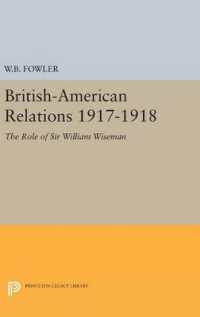- ホーム
- > 洋書
- > 英文書
- > History / World
Full Description
Late Antiquity marked one of the most significant transitions in European history-one that saw the rise of Christianity and the transformation of the classical Mediterranean world of ancient Rome. The richness of its art and the wealth of its archaeological remains have increasingly been recognised in recent decades and new discoveries and ongoing research are currently altering the ways in which we perceive the period. These two volumes provide a wide-ranging guide to the art and archaeology of the period 300-700 CE. Key monuments and artifact-types are discussed and placed in their historical contexts, but significant attention is also paid to the main cities, regions and peoples playing a prominent role in the history of the period as well as to some key issues and debates in its study. The chapters are written by leading experts and will be invaluable for any student or scholar interested in the period.
Contents
Part III. Urbanism and the Countryside: 28. Rome Paolo Liverani; 29. Constantinople Sarah Bassett; 30. Alexandria Marjorie Venit and Julie Marchand; 31. Antioch Gunnar Brands and Andrea U. De Giorgi; 32. Jerusalem Oren Gutfeld; 33. Carthage Richard Miles; 34. Ravenna Debora Mauskopf Deliyannis; 35. Trier Winfred Weber; 36. Cities in the West Neil Christie; 37. Cities in the East Helen Saradi; 38. Countrysides of the Late Roman Western Empire Cam Grey; 39. Countrysides of the Late Roman Eastern Empire Stephen Mitchell; 40. The Countryside in Late Antique North Africa Anna Leone; 41. The Balkans: Cities and Countrysides in Late Antiquity Renate Johanna Pillinger; Part IV. Regional and Ethnic Variety: 42. Peoples of Northern Europe Guy Halsall; 43. Peoples of Eastern Europe Florin Curta; 44. Peoples of Syria Emma Loosley Leeming; 45. Egypt Jennifer Cromwell and Matthew Gibbs; 46. Armenia Christina Maranci; 47. Early Islam Marcus Millwright; Part V. Issues and Debates: 48. The Economy of the Later Roman Empire Jeroen Poblome; 49. The Spread of Christianity Sebastian Ristow; 50. Barbarians and Migrations Peter Heather; 51. The Archaeology of Late Antique Identity William Bowden.








